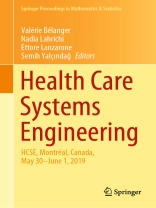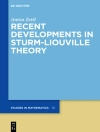This book presents the proceedings of the Fourth International Conference on Health Care Systems Engineering (HCSE 2019), which took place in Montreal, Canada, from May 30 to June 1, 2019. The event took place in the mother and child university hospital CHU Sainte-Justine in Montréal, and each session was co-chaired by a discussant coming from the clinical practice.
The conference offered scientists and practitioners an opportunity to discuss operations management issues in health care delivery systems, and to share new ideas, methods and technologies for improving the operation of health care organizations.
Focusing on applications of systems engineering, optimization and statistics to improve health care delivery and health systems, the book covers topics relating to a broad spectrum of concrete problems that pose challenges for researchers and practitioners alike, including hospital drug logistics, operating theatre management, blood donation, home care services, modeling, simulation, process mining and data mining in patient care and health care organizations.
Зміст
T. Foster, Non-emergency patient transfer scheduling and assignment.- Y.-H. Kuo, Non-emergency patients transportation with the consideration of user inconvenience.- P. Landa, Modelling hospital internal medicine wards to address patient complexity: a simulation-optimization approach.- C. Busby, Benefits of a Broader View: Patient Flow Modelling of Congested Hospitals.- L. Boyle, Coxian phase-type regression models for understanding the relationship between patient attributes, overcrowding, and length of stay in hospital emergency departments.- V. Bélanger, A Realistic Simulation Model of Montreal Emergency Medical Services.- F. Visintin, A two-phase approach to the Emergency Department Physician Rostering Problem.- P. Vanberkel, Using a slotted queueing model to predict the efficacy of Physician absent Emergency Department for rural communities.- K. Shin, A Meta Algorithm For Reinforcement Learning: Emergency Medical Service Resource Prioritization Problem in an MCI as an example.-C. Dosi, Facing Implementation barriers to simulation studies.- I. Marques, Reallocating operating room time: a Portuguese case.- K. Moons, Evaluating replenishment systems for disposable supplies at the operating theater: a simulation case study.- A. Orn Sigurpalsson, Stochastic surgery scheduling under a balanced ratio of in- and outpatients and ward uncertainty.- S. Germain, Multicriteria Scheduling Optimization in Home Health Care.- M. Shiri, 15. A Two-Phase Method for Robust Home Healthcare Problem: A Case Study.- L.-M. Rousseau, Adverse Event Prediction by Telemonitoring and Deep Learning.- A. Guinet, Mass casualty events: a decision making tool for home health care to discharge conventional hospitals.- N. Lahrichi, Simultaneous optimization of appointment grid and technologist scheduling in a radiology center.- B. Vieira, Mathematical programming models for radiotherapy scheduling with time windows.- R. Aringhieri, 20. Pattern-based online algorithms for a general patient-centred radiotherapy scheduling problem.- A. Robbes, Multi-level heuristic to optimize the chemotherapy production and delivery.- N. Aslani, Appointment type-based access time evaluation in primary care.- S. Yalçındağ, Uncertainty in the Blood Donation Appointment Scheduling: Key Factors and Research Perspectives.
Про автора
Valérie Bélanger is an Assistant Professor at the HEC Montréal. She holds an MS in Mechanical Engineering (Université Laval) and a Ph D in Decision Sciences (HEC Montréal). Her research focuses on health care logistics and emergency service management, while her methodological expertise is operations research. She works with various organizations in the health care sector on projects related to patient and material transportation, home care, and network design.
Nadia Lahrichi holds a Ph D in Operations Research from the Polytechnique Montréal, where she is now an Associate Professor at the Department of Mathematical and Industrial Engineering. Her research focuses in applying modeling and operational research tools in healthcare, and she has recently investigated patient flow optimization, scheduling and workforce planning problems.
Ettore Lanzarone is a Researcher at the Institute for Applied Mathematics and Information Technology (IMATI) of the National Research Council of Italy (CNR), and an Adjunct Professor at the University of Bergamo and the Politecnico di Milano. He holds a Ph D in Bioengineering and an MS in Biomedical Engineering from the Politecnico di Milano. His research activities include operations research applied to health care, stochastic modeling, and bioengineering.
Semih Yalçındağ is an Assistant Professor at the Industrial and Systems Engineering Department of the Yeditepe University. He holds an MS in Industrial Engineering from Sabancı University, and a joint Ph D in Industrial Engineering from Politecnico di Milano and École Centrale Paris. His research focuses on applied operations research, and he is currently woking on modeling and solving optimization problems in healthcare operations, scheduling and sequencing, transportation and sustainable operations.












